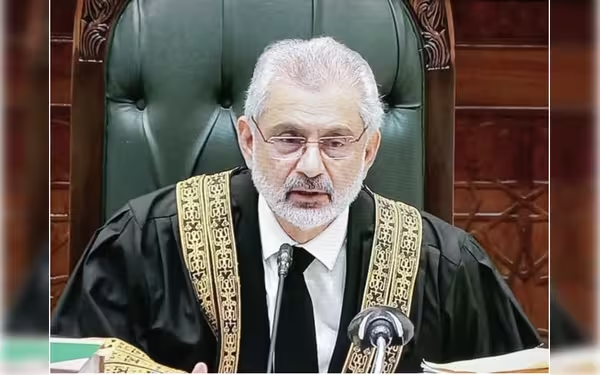Saturday, November 16, 2024 10:31 PM
Opposition Grows Against Chief Justice Isa's Appointment to Federal Court of Justice
- Significant opposition to Chief Justice Isa's proposed appointment.
- Concerns over judiciary politicization and independence.
- Supporters argue FCC could improve judicial efficiency.
 Image Credits: tribune.com.pk
Image Credits: tribune.com.pkOpposition mounts against Chief Justice Isa's appointment to lead the new Federal Court of Justice amid concerns over judicial independence.
The recent proposal to appoint Chief Justice Isa as the head of the proposed Federal Court of Justice (FCC) has sparked significant opposition among various quarters. This development comes at a time when the judicial landscape in Pakistan is under intense scrutiny, and the implications of such an appointment could be far-reaching. Chief Justice Isa, known for his strong stance on judicial independence, has been a prominent figure in the legal community, and his potential elevation to this new position raises questions about the future direction of the judiciary.
According to government sources, discussions are ongoing regarding this proposal, which aims to establish the FCC as a new judicial body. The FCC is intended to address specific legal issues and streamline the judicial process in Pakistan. However, the suggestion to place Chief Justice Isa at the helm has not been met with unanimous support. A retired Supreme Court judge from Sindh has publicly confirmed that he has authorized Malik to challenge the creation of the FCC, indicating that there are serious concerns about the legitimacy and necessity of this new court.
Critics argue that appointing Chief Justice Isa could lead to further politicization of the judiciary, undermining its independence. They fear that the establishment of the FCC, coupled with Isa's leadership, might create a scenario where judicial decisions are influenced by external pressures. This sentiment is echoed by various legal experts who believe that the current judicial system, despite its flaws, should be reformed rather than replaced.
On the other hand, supporters of the proposal argue that the FCC could provide a much-needed platform for addressing the backlog of cases and improving the efficiency of the judicial process. They believe that Chief Justice Isa's experience and commitment to justice could help steer the new court in a positive direction. However, the growing opposition suggests that many are not convinced of the potential benefits.
As the debate continues, it is essential for stakeholders to consider the broader implications of such an appointment. The judiciary plays a crucial role in upholding the rule of law and protecting citizens' rights. Therefore, any changes to its structure or leadership must be approached with caution and thorough deliberation. The future of the FCC and its leadership will undoubtedly shape the judicial landscape in Pakistan for years to come, making it a topic worthy of close attention.













